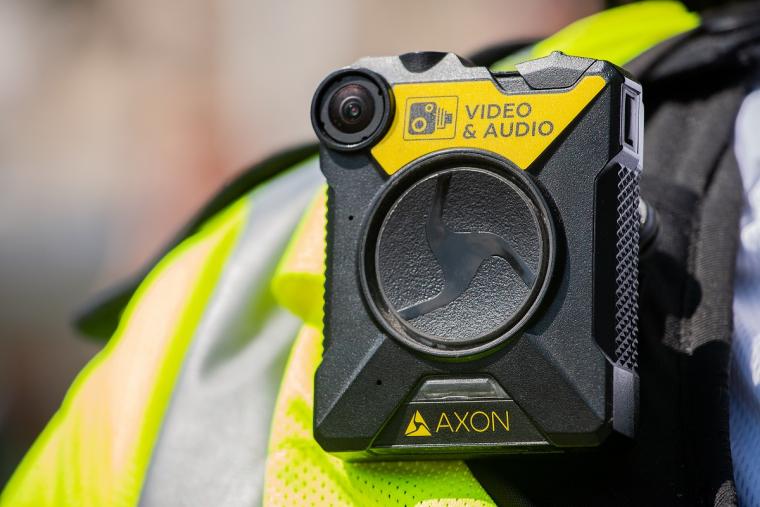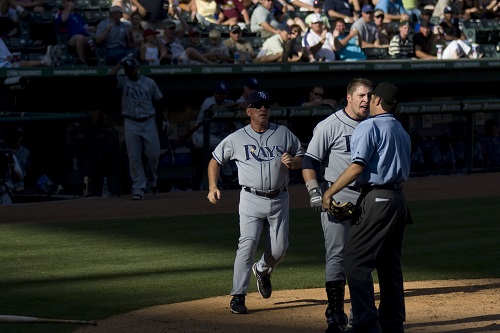
Earlier this year, a soccer league in the United Kingdom became, by its own claim, the “first league in the world” to equip referees with body cameras.
The Manjaros Langbaurgh League in Middlesbrough received permission from the International Football Association Board [IFAB] to begin the trial run with four adult grassroots leagues across the country prior to other leagues in Liverpool, Worcester and Essex following suit before the end of the 2022-23 season. The experiment introduces technology to explore whether the use of bodycams improves player behavior and respect toward referees, and the footage also can be accepted as evidence in a disciplinary hearing if required, according to the league.
“Match officials have embraced it and the players are enjoying it, as well,” Ross Joyce, referee development manager with the North Riding FA and an official in the English Football League, told TheAthletic.com approximately seven weeks into the trial. “Hopefully, it’ll play a key part in retaining referees, help them feel a bit safer.”
“So far, so good,” added Dan Meeson, the Football Association’s head of refereeing. “We haven’t had any activations yet, so that in itself should give us reassurance that things are going well. The feedback from the referees is that they do feel a little bit safer and more confident in what they’re doing.”
 TheAthletic.com reported that “a bleak total of 380 players and coaches were banned for attacking or threatening match officials last season, figures that pose challenges to the recruitment and retention of the 29,000 referees registered with the Football Association.”
TheAthletic.com reported that “a bleak total of 380 players and coaches were banned for attacking or threatening match officials last season, figures that pose challenges to the recruitment and retention of the 29,000 referees registered with the Football Association.”
“We feel there’s an opportunity here, that we can show some leadership and try to curb the culture of referee abuse, which is the number one reason why referees leave the game and sport in general. This is not acceptable. And honestly, seeing these referees with cameras on them today is a pretty sad state of where our society is,” Ontario Soccer CEO Johnny Misley told the CBC, adding that 50 bodycams are available to the roughly 6,000 referees in the province.
The pilot program is a partnership between Ontario Soccer and Brock University, which is overseeing the research component of the evidence-based trial to determine whether the cameras serve as a deterrent to bad behavior. Researchers will use surveys to assess whether game officials believe the technology curbs mistreatment.
Ontario Soccer provides leadership and support to 18 district associations, with membership that includes more than 500 youth and senior clubs across Ontario — from recreation to elite teams, plus Ontario’s Player Development League. The trial is expected to run through the outdoor season (which concludes in October) and then carry on into the indoor soccer season, according to Misley. Preliminary data is expected to be available in November.
“These partnerships with the sport industry are incredibly important, as we see sport moving in a direction where managers are using research-based evidence to make decisions,” Shannon Kerwin, Brock University Sport Management associate professor and co-investigator, said in a statement. “In collaboration with the Centre for Sport Capacity, we are here to support organizations like Ontario Soccer in those endeavors … and we anticipate further collaborations to inform future decisions.”
Not all Ontario-area soccer organizations are on board with bodycams, though.
“We have not mandated it,” David Frizzell, executive director of Guelph Soccer, told GuelphToday.com. “We are not telling our officials that they have to do this. There is an opportunity for the referees, if they would like to participate and opt into it, [to] be part of the pilot project. … If the outcome is that they feel like it’s worthwhile, and it does protect referees, then we would certainly fully support that.”
For now, Frizzell added, Guelph Soccer remains focused on “seeing what we can do to communicate to our parents, to our coaches, managers, players, just with regards to code of conduct on and off the field, and that includes how to interact with the officials.”

